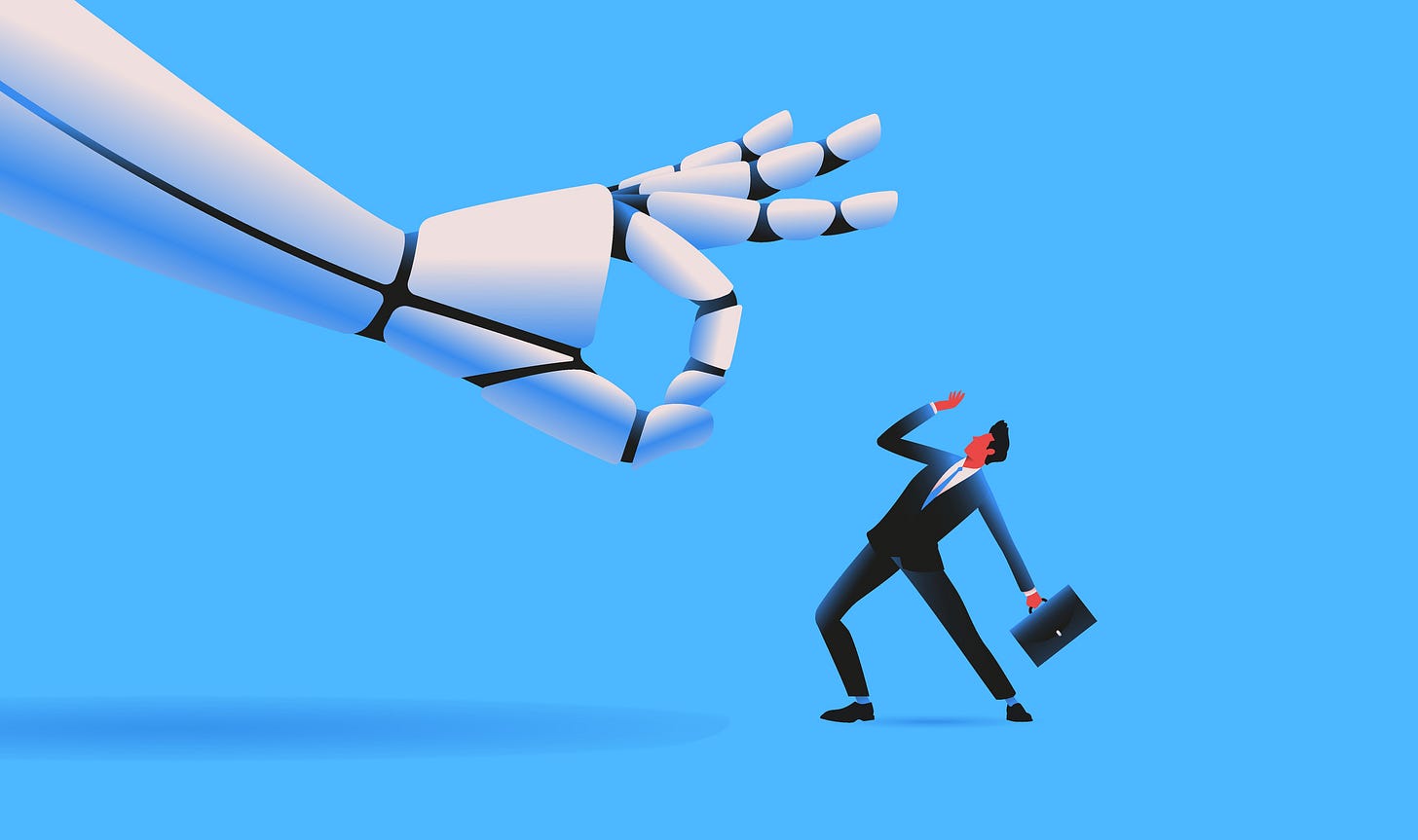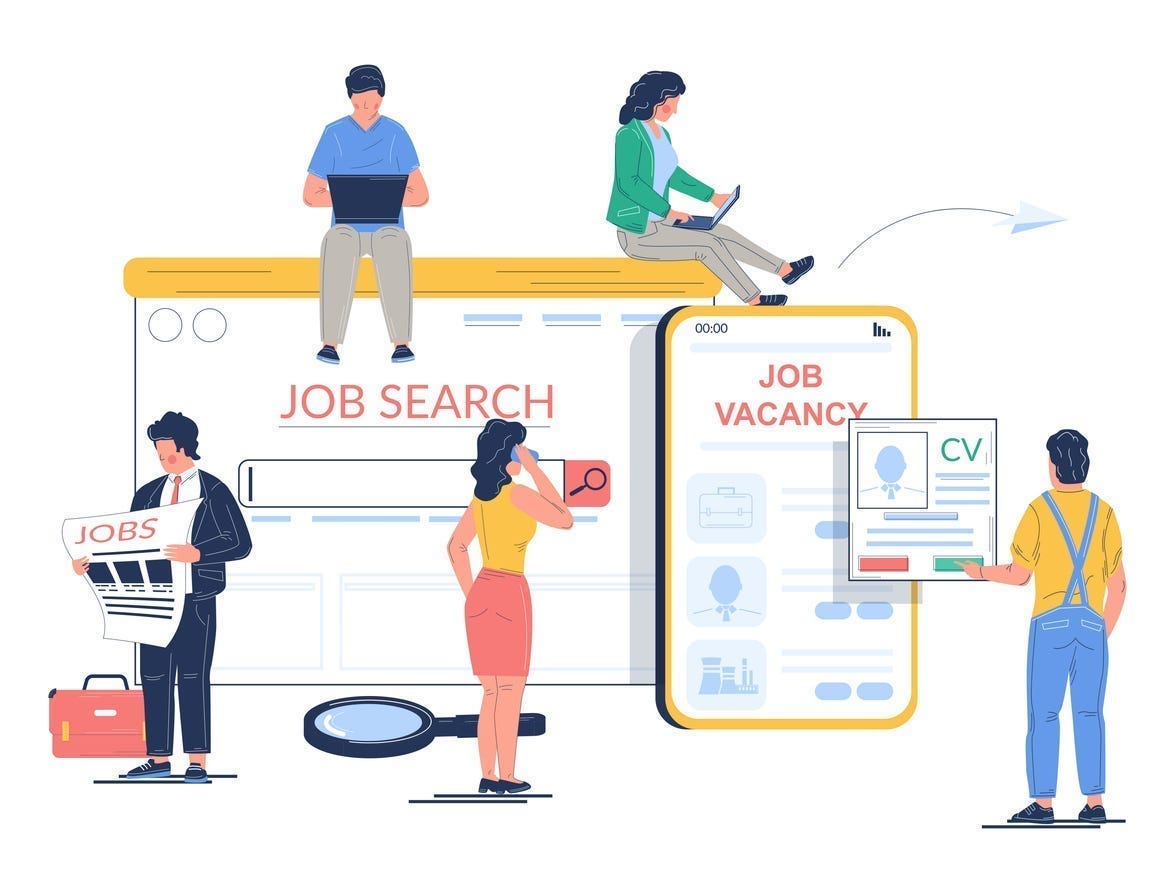For as long as I’ve written about careers, it’s been an article of faith that robots were coming for humans’ jobs. Research indicated that jobs involving repetitive work or manual labor were likely to fall first. Truck drivers, line workers, customer service representatives—any and every job that could theoretically be performed more cheaply by a machine was at immediate risk.
Of course, part of what differentiates us from the robots is our ability to feel smug. And those of us in creative fields did feel like we had an advantage. Sure, you can develop an algorithm to field calls or build a device to assemble widgets. But can you train an AI to write?
Enter ChatGPT, a chatbot program that can take human prompts and churn out everything from sonnets to cover letters to product reviews. And suddenly, it seemed like artificial intelligence might be a real threat to jobs in media, technology, law, education, and more.
Professionals began to get very nervous and for good reason. If companies can replace expensive human workers with relatively cheap software licenses, you can bet that they will. But are we there yet—and if we’re getting close, what can we do to protect our livelihoods?
Don’t Panic
I will confess to spending a sweaty day or two after the ChatGPT launch wondering about the future of my own career. Service journalism needs to be specific enough to be actionable but broad enough to support as many readers as possible. It’s not hard to picture ChatGPT or another AI coming for at least some of my work.
However, the more I read about the coming AI revolution, the better I felt. Make no mistake: these LLMs are an amazing technology and likely to get more skilled with each release. But so far, they’re shaping up to be tools, not human replacements. Without supervision, the current crop of large language model-based programs are more likely to break something, plagiarize human writers, or repeat factual errors than to upend the job market.
Remember when self-driving cars were going to replace every rideshare driver and trucker? Well, it turns out that lived human experience is hard to replicate. Again, these technologies may catch up—but they’re not there yet.
Focus on What Makes You Unique
I’m not a futurist, but I predict that AI tools will change many jobs for the better in one specific way: they will increase the value of creativity and original thinking. For example, as a writer who works mostly online, I’ve read (and written, ahem) about a million listicles. You know the type—X Ways to Save Money During a Recession, X Signs That You’re on Track for Retirement, and so on.
There’s nothing wrong with these formats. They’re easy to skim and simple to understand. Search engines like them and so do users. But they’re also easier for robots to replicate, which means that writers and editors will have to get more creative to differentiate themselves from AI. That presents a nice challenge for creatives and a welcome change for readers.
Leaning into what makes humans special is good for your career, no matter what you do. Think of it in terms of job seeking. You can use a resume template or cover letter sample or even an AI chatbot to help you develop your job application materials. But an AI can’t decide what you value in a company culture. It can’t impress a hiring manager during a job interview. And it can’t maintain a strong network by helping others so that there will be folks who want to help you when you need it.
Learn the Technology
Automation might not destroy your career—but it will probably change it. So, it’s best to learn how to use these tools as they emerge.
For now, ChatGPT has a free version. It’s worth trying out, especially if you’re worried that your job might be at risk. Knowing how to use these tools can only benefit your career, which may evolve to include using machine learning programs.
Stay Flexible
Of course, it’s also possible—maybe even probable—that some of us will lose our jobs because of automation, whether it's through a chatbot, or an automated phone menu, or robotic factory equipment.
The best approach is to stay flexible and curious. Career preparation isn’t a one-time deal. To be successful in a rapidly changing world, we’ll all have to keep learning and growing, whether we stay in our current occupations or retrain for jobs that are being invented right before our eyes.
Our Favorite Tools & Tips
How To Get Paid To Go To School: Are you considering returning to school? Whether you're looking at full-time or part-time, here's advice from Investopedia on finding grants, scholarships, and other tuition benefits that will pay you or reimburse you for college classes.
STAR Method Coach: Interviewing is almost always a challenge, even when you’ve done it a lot. STAR Method Coach can help you practice the STAR interview technique, which is one of the best ways to ace an interview. You can try two interview questions for free and sign up for a subscription for unlimited questions. Use code "JOBHOPPER50" for 50% off a subscription. (Note: STAR Method Coach is a sponsor, but editorial recommendations are independent of sponsorship relationships.)
Truity Photo Career Quiz: The Photo Career Quiz is a fun quiz that only takes a few minutes. All you need to do is look at a series of two photographs and click on which one you like best. When you’re done, you’ll get a free profile of your career interests.
News & Noteworthy
Can Your Employer Force You To Return to the Office? As more companies are requiring employees to return to work in the office, you might wonder if your employer can legally do that. In most cases, they can. Halulen Law says, "Unless your employer hired you in a role specifically designated as a remote position, you have a contract in place, or you have a disability that requires accommodation, options are limited."
Is The Election Making You Anxious? If you’re feeling stressed about the election, it’s not just you. Boston University reports that 60% of respondents in one survey and 73% in another said the election makes them anxious. Here are some tips from BU experts on managing stress during challenging times.
The Best (and Worst) Reasons for Leaving a Job: When you're applying for a new job or turning in your resignation, one of the questions you'll need to answer is why you are leaving or have left a job. It's important to be careful how you respond. Here's a list of some good—and not so good—reasons for leaving your job.
Sponsored by Remotive
When you’re looking for a 100% remote job, Remotive can expedite your search, and the basic version (2000+ jobs) is free. Learn more about how Remotive can accelerate your job search, and sign up for the Remotive Accelerator to access over 30,000 listings and the Slack community for a one-time fee.
Note: We may receive a small commission if you sign up using this link.







This was an interesting read.
I've given this topic a massive amount of thought and have spent a few months working on a series of as-yet-unpublished articles about this.
Speaking as a human writer to other human writers, I think our opinions and personal brands are shaping up to be a couple of our most important differentiators.
Genuine brilliance could be another differentiator.
And, developing solid expertise at the cutting edge of new technology could also be another important differentiator.
These things are all easy to talk about but not so easy to accomplish.
I'm acquainted with website owners who do not seem to care if the AI technologies plagiarize human writers or repeat factual errors -- sad, but true.